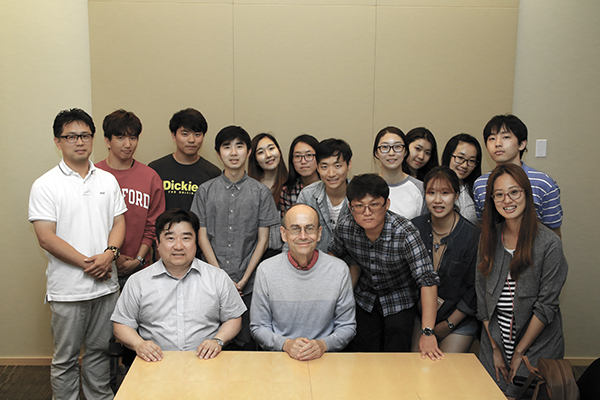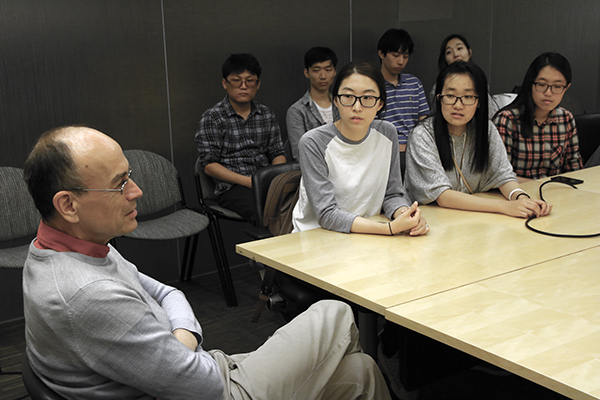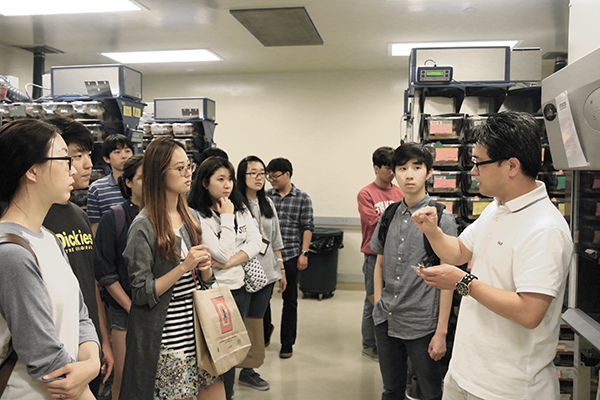Media Center
A multimedia mosaic of moments at GIST
People
Transcript of discussion between GIST College students and Dr. Thomas Sudhof, the 2013 Nobel Laureate in Physiology or Medicine
- 엘리스 리
- REG_DATE : 2015.08.21
- HIT : 2116
Transcript of discussion between GIST College students and Dr. Thomas Südhof,
the 2013 Nobel Laureate in Physiology or Medicine
Institute for Stem Cell Biology and Regenerative Medicine, Stanford University
Conference Hall: July 24, 2015 at 4:00 pm

Dr. Steve Kyungrae Cho (조경래) of GIST College:
Hi, Tom! Nice to see you again. It has been a while since we met at UT Southwestern Medical Center at Dallas. Thank you for having us today.
Dr. Thomas Südhof of Stanford University:
No problem. Are you in Korea now? Tell me about your students. Are they juniors or seniors? And, all bio majors?
Dr. Cho:
Yes, Tom. I am in Gwangju, Korea, and I am now concentrating on teaching young minds! They are all sophomores, and they don’t need to decide their majors until the end of their second years. We do this because we believe a solid foundation of liberal arts in addition to science education is very important for the modern research field.
Dr. Südhof:
Yes, I agree. What can I do for you today?
Dr. Cho:
These students wanted to come see you and ask a few questions about yourself and your research. Who wants to ask the first question?
GIST Student:
Who was the best teacher you’ve had that helped your research?
Dr. Südhof:
Believe it or not, it was actually my bassoon teacher when I was in grade school. I believe that creativity is a very important aspect of science and shouldn’t be neglected. I love classical music. Activities like music and art stimulate areas of thinking that science can’t, and often times the answer is found through other areas of life, not just science.
GIST Student (손지수):
What is your final goal as a scientist or researcher?
Dr. Südhof:
My final goal as a scientist and a researcher is to better understand how--in my case--how neurons in the brain communicate with each other to process information and to allow the brain to work. And I would like to understand this at a level--at a mechanistic level--so that we know how it works. And I think that is valuable not only for biomedical research for diseases, but it is also valuable for us as humans because it is the brain that makes us humans. And I think it is valuable to understand better ourselves.
GIST Student (한귀동):
Our college only started five years ago and what would be your advice to second year college students like us?
Dr. Südhof:
Well, my advice in general would be to focus on what you are interested in and not on where you think the jobs are or the opportunities are or the money is. You know, I think in our world people think too much about money, and the thing is that--you know you only have one life. And in the end, you are going to die, okay? It is important to do something that you actually believe in and enjoy for its own sake and not just for making money. And so I think it is important to study things that you really think are interesting and important and not things that you are not really interested in, okay?
In fact, I find it kind of amazing that people who are already incredibly rich mostly spend their time to get richer, so there is never an end. It seems pointless. So as long as you have a good life, and most people in our society have a reasonably good life, especially when you are college educated. It is more important to spend your time on something that you actually like. You know you also get better at it. It is very difficult to be good at doing something you don"t like doing because your brain does not want to do it.

GIST Student (김아린):
I have heard that you are German, but now you are studying and working in America. What is the biggest obstacle when you are studying or researching abroad?
Dr. Südhof:
Oh, I am German. I am also by now an American, and I have lived in the United States for a long time because my family is from here. So I feel that I am both at this point. I think that the United States is a good country to be in because it is diverse ethnically. There is many different types of people around here. I think that it is very important to be able to express yourself--if you are in America--in English. That is crucial. It is really not that important to have no accent, so it is perfectly fine to have an accent. I have an accent. I will always have an accent even though I have lived most of my life here. And it is more important to learn how to communicate, and this is particularly important in the United States.
Working over the years with many people from Asia--whether it is Chinese, Koreans, Japanese--I think one of the biggest problems that people from Asia--from different countries--have is the ability to communicate. So that is probably the most important, and it is usually much easier for women to communicate than for men, so men have more problems generally.
Everyone: [Laughter].
Dr. Cho:
Okay, a couple more questions?
GIST Student (이재영):
Do you think conducting research can be relaxing?
Dr. Südhof:
Sure! Yeah, it can be because--you know--I find it relaxing to analyze data. To look at stuff. To learn. What is stressful in doing research are other parts. Dealing, for example, with management issues can be quite stressful. But the actual process of understanding--of figuring things out--I think, personally, can be very relaxing.
GIST Student (이재영):
And do you enjoy the research?
Everyone: [Laughter].
Dr. Südhof:
Of course! Very much so! I think that, although I am underpaid...
Dr. Cho and students: [Laughter].
Dr. Südhof:
...I get enough money to live comfortably, and I think I have a great job. And I love what I do.
GIST Student (황승하):
What is your motivation?
Dr. Südhof:
One thing is that I really--as I said--enjoy what I do, and I like to do things that I enjoy. Another thing is that I do think there is enormous value in discovering how something works, and discovering--in a general sense--in discovering truth, in discovering fact, in understanding. I think that it is a value for human society. It is a value for--in many ways if you want--humanity. I think it is something that is shared among all cultures not specific to the Western or Eastern culture even though it was originally developed as a value in the Western culture. So I think it is generally acknowledged in all cultures to be valuable, and so my motivation is to contribute to that.
Dr. Cho:
Maybe two more questions.
GIST Student (이승엽):
Are there any crisis during your research, and how can you overcome that?
Dr. Südhof:
Crisis. Well, you know what can happen--so as a scientist, what often happen is that you have the wrong idea. But that is not a crisis because the way science works is that you develop an idea and then you try to test it. You try to figure out if it is true. And so if you are wrong, that I think is the normal process of science, and you say, "I am wrong." This is the way it is with me. Another difficulty can be that you don"t actually--you cannot--basically you don"t even get the grants to perform your science or you don"t have enough money or you can"t get your papers accepted after you send them. Thing like this. That happens all the time. And, you know, these are setbacks. And sometimes we don"t have enough money to pay everybody, and we have to shrink the lab. And things like this do happen, but--you know--this is life.
I think the worst thing that I have had to deal with in my lab was the notion that happened many years ago when I was still in Dallas, Texas, where I worked for many years, that maybe somebody in the lab was not honest, and that is really a difficult thing to deal with because in our lab--working with people depends on trust. And if somebody violates trust then there will always be disappointment.
Dr. Cho:
One last question. Anyone else?
GIST Student (손지수):
I read a short article about your research. Do you have good reasons for your approach?
Dr. Südhof:
Well, one thing in science is that it is always a good idea to work on things that other people don"t work on...
Everyone: [Laughter].
Dr. Südhof:
...because you are never smarter than the other people. So if you don"t have to compete, don"t compete. Okay, one last question.
GIST Student (김현우):
How much mathematical knowledge is required in your laboratory?
Dr. Südhof:
That depends. You see it really depends because we use a lot of different approaches, and you need to--I think--be able to understand a significant amount of math and physics if you do physiology or electro-physiology. But for biochemistry, I think you need other skills, which are just as valuable. So it really depends.
GIST Student (김현우):
How about in your laboratory? Your research?
Dr. Südhof:
In my lab, we do all these kinds of things.
Dr. Cho:
All right! Thank you very much for your time, Dr. Südhof!
